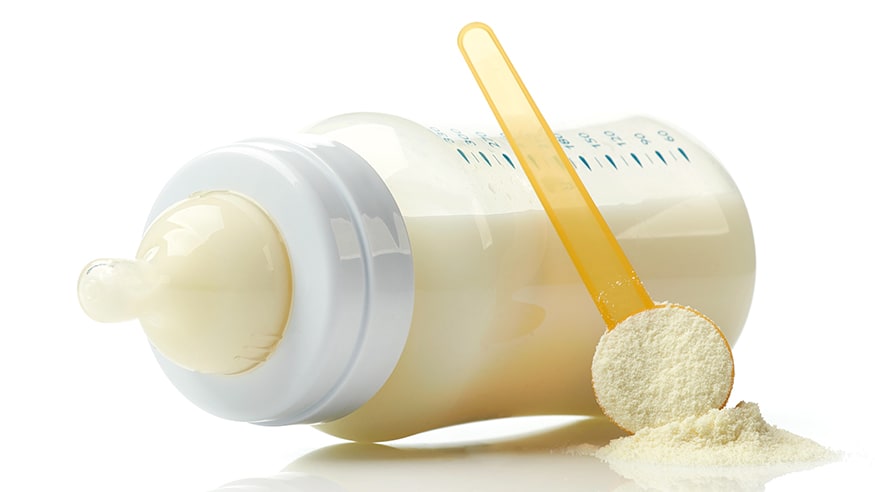Baby formula is an essential part of many parents’ lives. It provides a safe, nutritious way to feed their babies and helps prevent illnesses due to improper nutrition. However, like any other food, baby formula can be contaminated with germs and harmful bacteria that could cause serious health problems if ingested. In this article, we will explore the dangers of germs in baby formula, how to keep your infant’s formula safe, and how long it can be stored at room temperature.

Germs are microscopic organisms in many environments – including on surfaces such as baby formula cans. These tiny organisms can cause severe sickness if ingested or even just touched. The most commonly encountered germ in baby formula is Cronobacter sakazakii, which is known to cause severe illnesses in infants and young children. Cronobacter has been found in powdered milk-based formulas, herbal teas, starches, and other powdered foods. Parents must take precautions when handling these products to avoid contamination with germs that could lead to infection.
Parents must follow proper hygiene guidelines when preparing food to keep their baby’s formula safe from germs. Parents should always ensure that the containers used for mixing the formula are adequately sterilized and that utensils used for stirring or measuring are clean before each use. Additionally, all scoops and bottles should be rinsed with hot water after each use before being washed with soap and water; plastic bottles may even need to be boiled for them to be properly sanitized.
Once prepared, how long can you store infant formula at room temperature? Generally speaking, it is recommended that once designed, the formula not be left out for more than two hours – any longer than this increases the risk of contamination by germs such as Cronobacter sakazakii. To further reduce the risk of contamination – especially during warm weather or if you plan on storing it overnight – you should consider placing the bottle or container of prepared formula into a cooler filled with ice packs or frozen gel packs instead of leaving it at room temperature. This will slow bacterial growth while keeping your baby’s food cold until they are ready to eat it again later.
In summary, germs are ever-present threats when dealing with food products such as baby formulas; however, there are several steps parents can take to minimize their risk of exposure and contamination from these tiny creatures: sterilize all containers used for mixing before each use; clean utensils used for stirring or measuring after each use; rinse plastic bottles with hot water before washing them with soap and water; boil plastic bottles if needed; keep prepared infant formulas cold by storing them in coolers filled with ice packets; discard any unused portions after two hours (or sooner). By considering these simple steps every time you prepare and handle your child’s food items – like those found within their favorite brand of baby formula – you can help ensure a happy and healthy future ahead!
Does Formula Go Bad After An Hour?
The formula can increase germs and go bad if left out at room temperature. Usually, the recommendation is to do it during the first hour after preparation.
One hour after making the formula, it must be eaten or stored in the refrigerator. Throw it away if it’s been sitting around at room temperature for over one hour. Throw away any formula your infant does not consume immediately; don’t preserve it for later use. Similarly, many people wonder why infant formula spoils after one hour. Every operation the infant has already had contact with is included in this rule. Bacteria get into the bottle when the infant drinks from it. You may keep unused BM and formula in the fridge for much longer.
Second, after an hour, do formulae have to be thrown away? After one hour, discard the formula left out at room temperature. The ready-to-feed procedure must be removed after 48 hours if kept in the refrigerator. Throw aside trecipeula if your baby doesn’t finish it within one hour. You may meet all of your baby’s needs at My Baby Nursery. Follow the directions on the bottle of baby formula very closely. Your baby formula can be prepared and stored following these guidelines. You must prepare your baby’s formula according to the manufacturer’s recommendations.
Preparing a day’s worth of time and storing them in the refrigerator is an option for many parents. For example, six to eight bottles can last you all day if your kid feeds every three to four hours. What if you leave your child with someone for a long time? Sometimes, creating only one or two bottles is more convenient, and providing instructions and materials (like bottles and nipples) so the caregiver may produce bottles as needed and avoid wasting recipes. After all, if you don’t use a combined mixture within 24 hours, you’ll have to toss it away.
- How Many Tablespoons is One Clove of Garlic? - June 26, 2024
- How to Measure 3/4 Cup When You Don’t Have the Right Measuring Cup? - June 6, 2024
- How Much Does Cooked Pasta Weight Compare To Dry? - April 30, 2024
